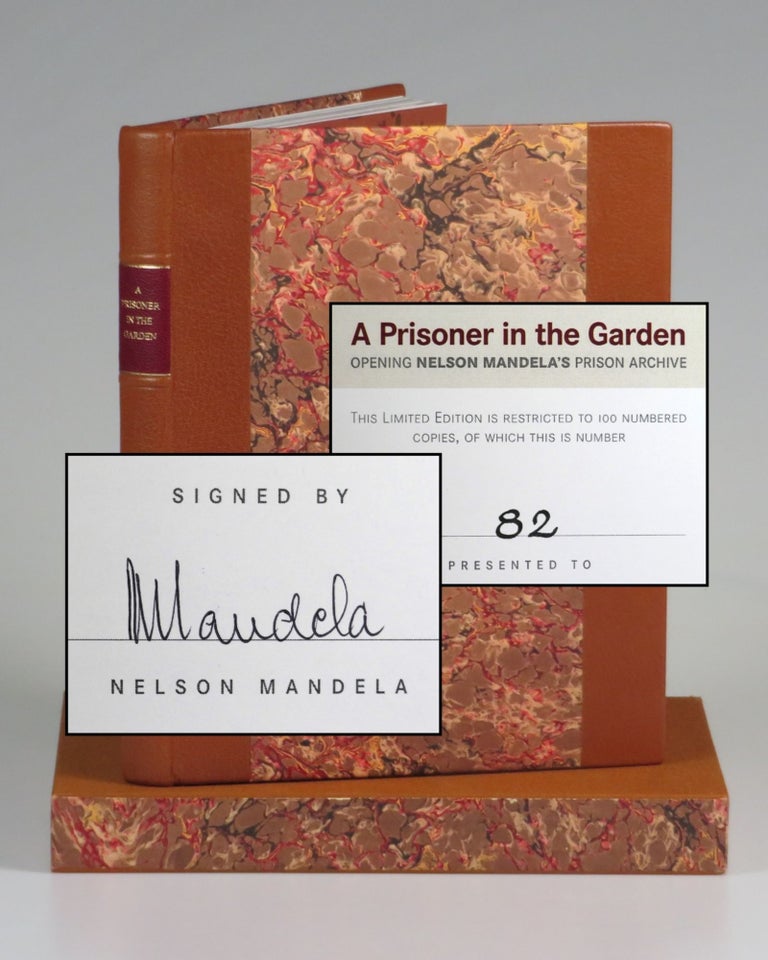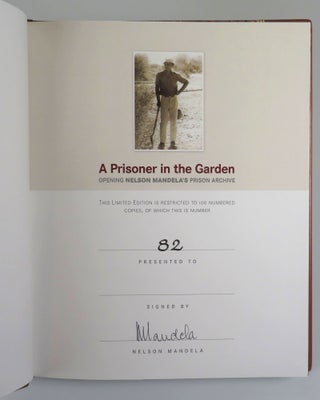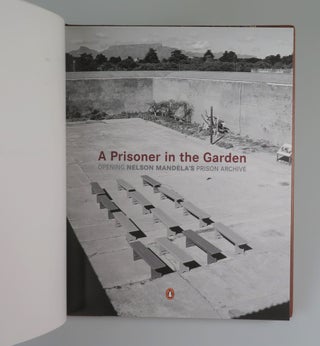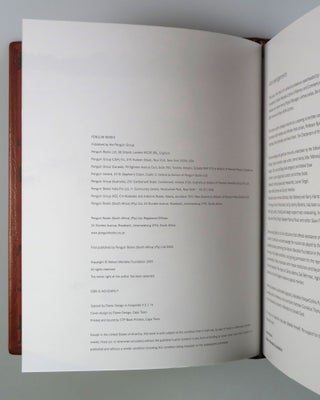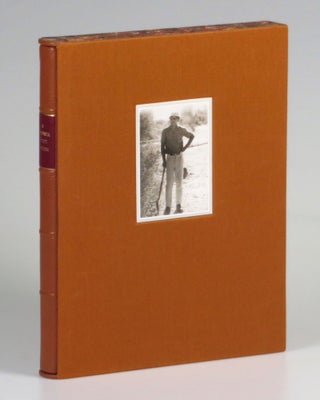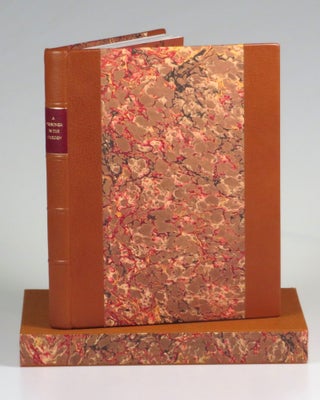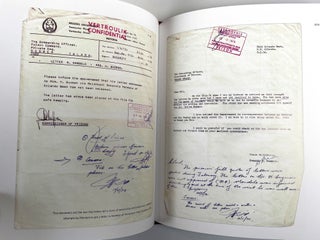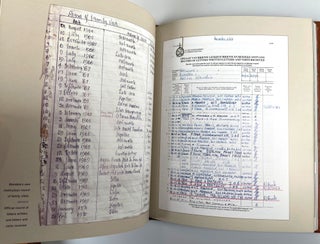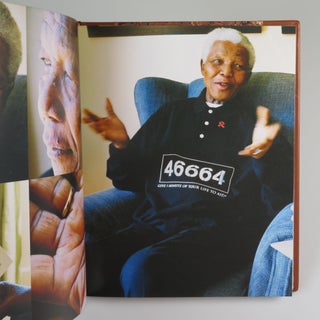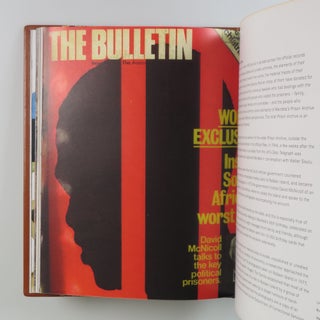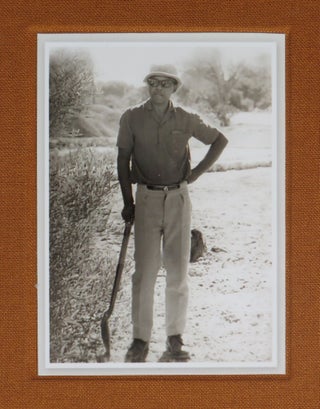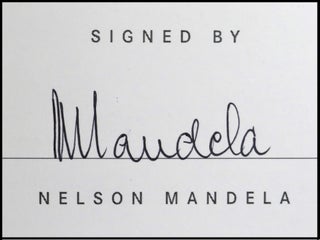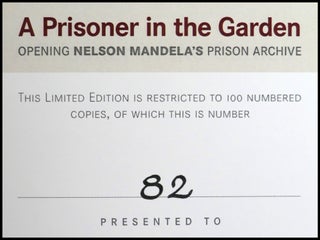A Prisoner in the Garden: Opening Nelson Mandela's Prison Archive, Copy No. 82 of 100 presentation copies thus, finely bound by the publisher and signed by Mandela
Johannesburg: Penguin Books, 2005. De-Luxe Limited Signed Edition. Full leather. This is the signed, limited, and numbered edition, one of 100 copies produced for personal presentation. The binding is half brown Morocco over marbled paper-covered boards with raised spine bands and red Morocco spine label. The profusely and compellingly illustrated contents are bound with printed endpapers and silk head and foot bands. The book is housed in the publisher’s brown cloth-covered slipcase featuring marbled paper ends and spine, rounded, leather capped opening, and an inset photograph of Mandela in the titular prison garden. The limitation page preceding the half title is hand-numbered “82”, and signed by Mandela above his printed name, the “PRESENTED TO” line still blank. Condition is pristine, the binding and contents both immaculately as-new, the slipcase genuinely fine with only trivial shelf scuffing to the bottom edge.
Among a myriad of compelling images, captions, and vignettes, Prisoner in the Garden contains previously unpublished images, documents, and diary and letter extracts, as well as some original notes from the writing of Mandela’s autobiography, A Long Walk to Freedom. Mandela speaks of the impetus, process, and this product of unlocking the Prison Archive in his Foreword.
Of the titular garden, in Long Walk to Freedom, Mandela relates “The Bible tells us that gardens preceded gardeners, but that was not the case at Pollsmoor, where… I decided to start a garden and received permission to do so from the commanding officer.”
“Each morning, I put on a straw hat and rough gloves and worked in the garden for two hours. Every Sunday, I would supply vegetables to the kitchen so that they could cook a special meal for the common-law prisoners. I also gave quite a lot of my harvest to the warders, who used to bring satchels to take away their fresh vegetables.”
“A garden was one of the few things in prison that one could control… A leader must also tend his garden; he, too, plants seeds... Like the gardener, a leader must take responsibility for what he cultivates; he must mind his work, try to repel enemies, preserve what can be preserved, and eliminate what cannot succeed.”
Nelson Mandela (1918-2013) was born Rolihlahla Mandela in the tiny village of Mvezo in the Eastern Cape. It was in primary school that he was given the “English” name Nelson. He managed to secure his bachelors degree only after first being expelled for joining a student protest. Mandela joined the African National Congress (ANC) in 1944, four years before Apartheid was adopted as a formal policy by the South African government.
Rising through the ranks, in 1952 Mandela both co-founded South Africa’s first black law firm and began to accrue official charges by the government. Eventually Mandela had restrictions placed upon him and the ANC itself was banned.
By late 1961 Mandela had resorted to preparing for armed struggle, undertaking leadership of Umkhonto we Sizwe, or Spear of the Nation. Facing the death penalty on trial for sabotage, in 1964 Mandela delivered his famous ‘On the Docks’ speech. During my lifetime I have dedicated myself to this struggle of the African people. I have fought against white domination, and I have fought against black domination. I have cherished the ideal of a democratic and free society in which all persons live together in harmony and with equal opportunities. It is an ideal which I hope to live for and to achieve. But if needs be, it is an ideal for which I am prepared to die. Less than two months after he spoke these resonating words, Mandela and his co-conspirators were convicted and sentenced to life in prison.
Mandela was finally released in February 1990 by then-president of South Africa de Klerk. Mandela was integral to negotiations to end white minority rule; he and de Clerk were jointly awarded the Nobel Peace Prize in 1993. Mandela voted for the first time in his life on 27 April 1994 and was inaugurated two weeks later as South Africa’s first democratically elected president. Item #006993
Price: $5,500.00

